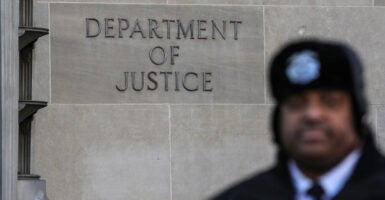For anyone who thinks that passing HR 4, the John Lewis Voting Rights Advancement Act, is a good idea, watching the startling testimony of a veteran Justice Department lawyer should make one quickly realize what a bad—and dangerous—idea it really is.
At a hearing Tuesday intended to build support for HR 4, Maureen Riordan did the exact opposite. A career attorney who served in the Voting Section of the Justice Department’s Civil Rights Division for more than two decades, she testified before the House Judiciary Committee on the long history of abuses she witnessed while working at the department.
HR 4 would bring back and vastly expand the preclearance (preapproval) process of Section 5 of the Voting Rights Act of 1965. Section 5 required a small number of states, such as Alabama and Georgia, to get the Justice Department’s approval before making any changes in their voting laws.
In 2013, in Shelby County v. Holder, the Supreme Court ended the preclearance requirement because it rightly recognized that time had not stood still.
Section 5 was only meant to be a temporary provision addressing some egregious practices that were happening in certain states in 1965. Fortunately, the type of systematic, widespread voting discrimination that was occurring then is long gone, and Section 5 was no longer necessary.
The court held that Congress could not rely on decades-old data to justify such a substantial intrusion into each state’s ability to pass and implement its own voting rules and procedures.
But HR 4 would bring preclearance back with a vengeance. It would give liberal bureaucrats inside the Voting Section the power to review and veto changes—any change, no matter how insignificant—in voting laws and regulations enacted by state legislators and election officials all over the country, including changes in polling place locations, voter ID and registration requirements, voter list maintenance standards, and the boundary lines in redistricting.
Riordan, now an attorney at the Public Interest Legal Foundation (where I serve on the board), exposed improper, partisan behavior she witnessed throughout her career, including during the 2000 presidential recount in Florida as Voting Section staff discussed strategies to assist the Democratic Party and sent faxes to then-Vice President Al Gore’s campaign operatives.
Long before the Supreme Court ruled that Section 5 was no longer necessary or justified, entrenched Justice Department bureaucrats had weaponized this power.
Riordan recounted a 2009 objection to a proposed voting change in Kinston, North Carolina, a town where African Americans are a majority of the population. In a referendum election, the town voted to remove party affiliations from ballots and switch to nonpartisan elections for members of its City Council.
Justice Department bureaucrats objected to this change, claiming it was discriminatory under Section 5 because black voters would not know who to vote for if the word “Democrat” wasn’t next to candidates’ names. That was a patronizingly insulting view of African American voters and an abuse of power that overruled the majority decision of the black voters of Kinston.
Another shocking story Riordan highlighted was the Justice Department rejecting an annexation of just two white people, who wanted to access city services, into the tiny town of North, South Carolina, where African Americans make up almost 42% of the population.
The Voting Section claimed that because the town could not show any proof that African Americans also had been annexed, adding two more white residents would dilute the African American share of the vote.
Riordan said she was “shocked” at “how political” the conduct of the lawyers inside the Voting Section was and testified that their actions were the “furthest thing from nonpartisan.”
The unethical disclosure by Voting Section staff of privileged information to reporters and others, she said, “happened on a regular basis,” and she recounted how a Voting Section analyst “lied under oath” to lawyers from the Justice Department’s Office of Inspector General.
Riordan’s testimony came as no surprise to me, based on what I observed when I worked on voting matters in the Civil Rights Division of the Justice Department as a career lawyer.
Other examples abound. In 2012, a federal court in South Carolina v. Holder overturned the Justice Department’s objection to South Carolina’s voter ID law—a lawsuit that cost the state millions of dollars to win.
In 1994, in a Georgia redistricting case, a federal court ruled against the Justice Department, issuing a scathing opinion charging that “the considerable influence of ACLU advocacy on the voting rights decisions of the United States Attorney General is an embarrassment” and expressing the court’s surprise that the Justice Department was “so blind to this impropriety.”
A 2013 report from the Justice Department’s inspector general—cited by Rep. Chip Roy, R-Texas, at the hearing—criticized the Voting Section for ignoring the resumes of qualified attorneys and hiring a majority of its lawyers from only five liberal advocacy organizations: the American Civil Liberties Union; the National Council of La Raza; the NAACP; the Lawyers’ Committee for Civil Rights Under Law; and the Mexican American Legal Defense and Educational Fund.
The abuses that Riordan laid out are still happening at the Justice Department today. Last week, the Justice Department filed a lawsuit against the state of Georgia, claiming that its election integrity law violated the Voting Rights Act. That’s a partisan lawsuit without merit.
If HR 4 were to pass, radical Justice Department bureaucrats will object to nearly every election integrity reform enacted by states.
Americans do not want biased federal bureaucrats running their elections. Washington should stay out of elections and let the states continue to run them as they have for more than 200 years.
Have an opinion about this article? To sound off, please email [email protected] and we’ll consider publishing your edited remarks in our regular “We Hear You” feature. Remember to include the url or headline of the article plus your name and town and/or state.
































